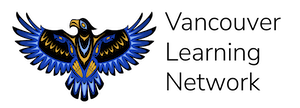Code of Conduct
Code of Conduct - Updated June 2024
Vancouver Learning Network
Code of Conduct
 (Date Reviewed June 14, 2022)
(Date Reviewed June 14, 2022)
The following introduction to the VLN code of conduct was developed by the VLN Student Voice in 2020-2021. The entire student body selected the eagle mascot to represent VLN.
EAGLES: Enthusiasm, Achievement, Goals, Learning, Empathy, Safety
Enthusiasm
Learning about the world and what other people think is one of the best things we can possibly do. VLN students are enthusiastic about these opportunities in their VLN courses.
Enthusiastic students are willing to learn from others, and always do their best work. When they need help, they are resourceful: they are self-directed and can think of clever ways to solve problems; they also reach out to teachers and others to get and offer help.
Achievement
Every student should strive to achieve the best of which they are capable. Whatever mark you get, if you have done your best, you have succeeded.
To achieve the highest levels of which they are capable, students follow teacher’s instructions carefully, do the best they can in assignments, and study well before exams.
When coming to VLN to write exams, students need to follow instructions carefully, complete their own exam as their own work, with no communication with other students, without giving or receiving any unauthorized help, and leave quickly and quietly when they have finished.
Plagiarism is the opposite of achievement. Copying the work of others and using it as your own is not an achievement.
Goals
VLN students take courses for specific goals. Some students take courses they can’t take at their home school; some students need better marks in courses; some students need courses to graduate.
Know why you are studying, it will make it all much more worthwhile; know what you need to achieve; aim to do your best.
Learning
There are always different kinds of lessons to learn in each course. Learn about the world and what other people think; learn about yourself and how you study; learn good ways to interact with your teacher online; learn ways to help yourself and other students.
Learn that you must always submit your own work, because using someone else’s work without proper attribution is cheating.
Empathy
Everyone is different and everyone is unique; everyone follows their own path in this life the best way they can. Accept differences, and do not judge.
Discrimination based on race, colour, ancestry, place of origin, religion, marital status, family status, physical or mental disability, gender, or sexual orientation is prohibited.
Safety
Emotional safety is just as important as physical safety. In your communications with other students, teachers, and office staff at VLN, make sure always to treat people with respect.
Bullying and any other kind of put-down is prohibited. Always be polite and try to understand the other’s perspective.
Be aware, not everyone is who they seem online. Do not give out personal information online.
Basic internet safety should be followed at VLN: use your VLN/VSB email to communicate with your teachers; set strong passwords to your VLN account; don’t post anything anywhere that you might regret when you get older.
Statement of Purpose
Vancouver Learning Network (VLN ) is committed to uphold a safe, inclusive, equitable, welcoming, nurturing, and healthy school environment.
Promote clear behavioural expectations of respectful and responsible citizenship that lead to a culture of safety, caring and respect amongst everyone in the school and programs and at all school-events and activities
The School Code of Conduct applies at school, during school-organized or sponsored activities, on school buses, and any behaviour even if outside of school or school hours, (including on-line behaviour), that negatively impacts the safe, caring, or orderly environment of the school, and/or student learning.
The School Code of Conduct applies also when students are working independently on online courses, concerning their interactions with other students and teachers as well as the materials they are submitting for their courses.
Conduct Expectations
Acceptable Conduct
Respecting self, others, and the school
Contributing to a safe, caring, positive, inclusive, and peaceful environment
Seeking to prevent violence and potentially violent situations, and demonstrating social responsibility by reporting such situations
Engaging in purposeful learning activities
Maintaining a high level of academic integrity.
Unacceptable Conduct
“Students shall not discriminate against others on the basis of Indigenous identity, race, religion, colour, ancestry, place of origin, marital status, family status, age, sex or sexual orientation, gender identity/expression, or physical or mental disability, or for any other reason set out in the Human Rights Code of British Columbia, nor shall a student publish or display anything that would indicate an intention to discriminate against another, or expose them to contempt or ridicule, on the basis of any such grounds.” Racism and discrimination will not be tolerated in our school.
Behaviours that interfere with the learning of other, interfere with an orderly environment, or create an unsafe environment
Acts of bullying, harassment, intimidation, or physical violence
Illegal acts, such as possession, use or distribution of illegal or restricted substances
Theft or damage to property
Plagiarism of all kinds, whether using work produced by other students, material downloaded from the Internet, or work generated by unauthorized applications, including Artificial Intelligence applications.
Note: Behaviours (both acceptable and unacceptable) cited in the code of conduct are examples only and not an all-inclusive list.
Rising Expectations
Students are expected to learn and mature as they move through successive grades, and as such the expectations progress towards increasing personal responsibility and self-discipline, as well as increasing consequences for inappropriate conduct/unacceptable behavior.
Retaliation Prevention
All reasonable steps will be taken to prevent retaliation against a student who has made a complaint of a breach of a code of conduct.
Consequences
Disciplinary action, wherever possible, is restorative rather than merely punitive. The school will treat seriously any behaviour that discriminates based on Indigenous identity, race, religion, colour, ancestry, place of origin, marital status, family status, age, sex or sexual orientation, gender identity/expression, or physical or mental disability.
Repetitive or severe unacceptable behaviour may result in increased severity of subsequent disciplinary action. The age and maturity of students are considered when determining appropriate consequences.
Special considerations may apply to students with special/diverse needs if these students are unable to comply with a code of conduct due to having a disability/challenge of an intellectual, physical, sensory, emotional, or behavioural nature.
Responses to unacceptable conduct are consistent and fair.
Students, as often as possible, are encouraged to participate in the development of meaningful consequences for violations of the established code of conduct.
Students may be prevented temporarily from continuing with VLN online courses or withdrawn completely from VLN online courses, depending on the severity of the plagiarism or other unacceptable behaviour.
Notifications
The principal or designate has a responsibility to inform other parties of serious breaches of the code of conduct. These parties include:
Parent(s) of student offender(s) and parent(s) of student victim(s) – in every instance
School district officials
Police and/or other agencies, as required by law
School community, when deemed necessary, to reassure members that school officials are taking appropriate action
Suspensions
In accordance with the School Act, Sec. 85 (2) (ii) and (d), the Board authorizes the principal or designate of any school in the district to suspend a student from attendance at school for up to five days.
Suspensions may be for the following reasons:
because a student is willfully and repeatedly disrespectful to a teacher or to any other employee of the Board carrying out responsibilities approved by the Board;
because the behaviour of the student breaches the District Code of Conduct or other policy and/or has a harmful effect on others or the learning environment of the school;
because the student has failed to comply with the School Code of Conduct.
Suspensions over five days are made in consultation with the appropriate Director of Instruction as per District Student Code of Conduct, AP 350.
As per AP 350 7.7 an educational program must be provided.


